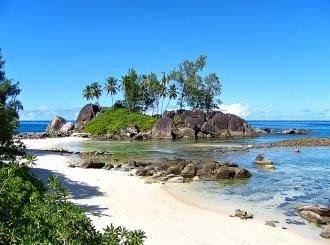
Addis Ababa, 1 September 2014 (ECA) - A new study by the United Nations Economic Commission for Africa (ECA) will for the first time, bring to the fore a serious discussion on the specific plight of African Small Island Development States, as they face rising sea levels, and dwindling economic activities in the face of climate change, according to officials of the African Climate Policy Centre (ACPC).
The study provides an update on the predicament of Cape Verde, Comoros, Guinea Bissau, Mauritius, São Tomé & Principe and Seychelles that often gets drowned in a narrative that focuses more on biophysical impacts with only superficial references to social vulnerability to climate change in these countries.
The paper will be one of the key scientific contributions by Africa to the forthcoming 3rd Conference on Small Island Development States that convenes at the Faleata Sports Complex, Apia-Samoa from 1-4 September 2014.
It highlights the major climate and development related challenges as well as the uniqueness of these challenges to the African SIDS, and elucidates the opportunities in these major frontiers of development in Africa, according to Ms. Fatima Denton, Director of the Special Initiative Division, and Coordinator of the African Climate Policy Center.
The study is titled “Climate change in the African Small Island Development State: from vulnerability to resilience --- the paradox of the small,” explores traditional subjects such as the effects of climate change on the ecosystems, agriculture, fisheries, etc. but also makes good inroads into an important new area - loss and damage.
“While long-coastlines of these countries expose them to a range of climate change impacts, sea level rise poses the greatest threat to many SIDS in the long-term - especially for atoll states - ocean acidification is already having a significant impact on coral reefs, affecting tourism and threatening livelihoods dependent on marine species”, the report states. “
This explains why these countries are doubly exposed to both irreversible and life threatening damage from biophysical impacts of climate change and dwindling resources and income opportunities as a result of high exposure of the resource-bases due to their locations, it adds.
It shows in what ways local communities in SIDS are in the frontline of climate change impacts and are already responding in adaptation to climate variability and change but cautions that effective adaptation will not happen in a vacuum - it will need to be facilitated, structured and organized within an institutional setting.
“Constrained by size and isolation, navigating integrated and interdependent systems in steering economic development while safeguarding the integrity of small island states, remains a puzzle”, it admits.
The study argues that, “with the remoteness and small size of African SIDS, harnessing economics of scale and the benefits of globally integrated commodity chains, are restricted” for these African nations.
“Therefore, understanding, anticipating and adapting to economic, social, environmental and climate related threads are critical for the security and stability of the economy of these countries.
It says that because the role of markets and the regulatory mechanisms to scale up and enhance the efficiency of the adaptation options tend to be within the purview of the state, mobilizing resources for investments to combat climate change will demand organizational strategy both nationally, regionally and internationally to leverage support for individual SIDS.
It draws from recent reports that identifies current and future climate-related risk drivers for small island states in the 21st century to include sea-level rise, tropical and extra-tropical cyclones, increasing air and sea surface temperatures and changing patterns of rainfall, with sea level rise as the most widely recognized threat following the low coast areas of islands and atolls.
It suggests that many of the international processes could do well to raise awareness so as to bolster support at home and enable African SIDS to enter into collaborative partnerships to ensure that many of their institutions are fit to respond to climate risks and capitalize on emerging opportunities.
Issued by:
ECA External Communications and Media Relations Section
PO Box 3001
Addis Ababa
Ethiopia
Tel: +251 11 551 5826
E-mail: ecainfo@uneca.org